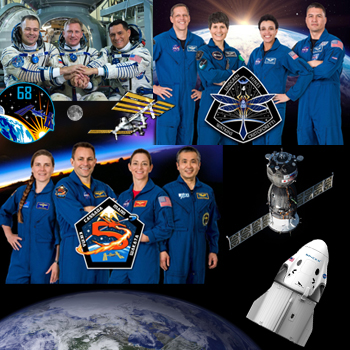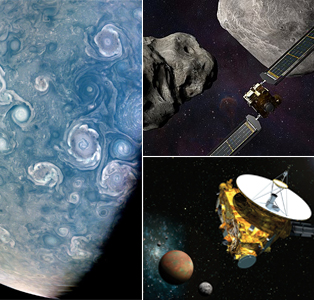ISS Expedition 68 Commencing with Soyuz MS-21 Departure, SpaceX Crew 5 Arrival
|
MONDAY☆ Sep 26 — ISS, ~415-km LEO: Expedition 67 seven-member crew to become Expedition 68 this week with Samantha Cristoforetti as Commander, will see 3 Cosmonauts return to Earth, continue work with Astrobees, foams and emulsions experiment, Sally Ride EarthKAM. ☆ Sep 26 — Tiangong Space Station, ~390-km LEO: Shenzhou 14 three-member crew looking toward Mengtian Experiment Module 2 launch by end of October, followed by Tianzhou 5 cargo ship Nov 3, Shenzhou 15 three-person crew Nov 28. Highlights… o NewSpace: Yang Yiqiang, founder of CAS Space in Beijing, aiming for suborbital tourism flights NET 2025; Nanoracks / Voyager to nurture commercial space and education in Latin America & Ukraine under MoU with 6 national space agencies; Starlink now active on 7 continents. ☆ Solar System: Water found in Ryugu asteroid sample and meteorite recovered in UK suggest H2O may be harvested from SSSBs; CNSA Chang’E-7 to carry UAE Rashid 2 rover to Moon South Pole region NET 2026; ILOA and Canadensys Aerospace reach agreement for ILO-1, ILO-2 prime instruments for Astronomy from the Moon. ☆ Galaxy: Max Planck Institute for Astronomy study identifies star cluster near center of MWG as remnants of 12.5B years old protogalaxy; ALMA and Event Horizon observations of hot gas bubble orbiting Sagittarius A* at 0.3c suggest its accretion disk is magnetically arrested with clockwise motion. o Global: ArianeGroup proposes 25,000-kg Susie vertically landing reusable capsule concept to ESA for deep space access; Axiom brokers deal sending Saudi Arabia astronauts to ISS on Ax-2 (NET Q2 2023), Türkiye astronaut possibly Ax-3 (NET late 2023); France to increase space budget by 25% (US$9.85B / 3 years), ESA also seeks 25% increase ($18.4B / 3 years) in member state dues. ● USA: SpaceX Super Heavy rocket prototype B8 on Orbital Launch Mount for tests as B7 being bolstered ahead of full stack WDR / 33-engine firing and next iteration B9 being built, orbital test expected NET Nov; NASA to proceed with Artemis 1 launch attempt 27 Sept following leak mitigation, Flight Termination System certification extension. ● Hawai’i: Hawaii State Supreme Court considering challenge of ‘industrial’ use of 525 acres of Mauna Kea Conservation District Lands for Astronomy Precinct; Harvard CfA / Max Planck GAIA observations of G-type (yellow dwarf) star thought to be in binary system with nearby black hole being verified by Keck Observatory. |
 |
● = Terrestrial events, and…
o = International terrestrial events in local time. ★ = Space events, and… ☆ = International space / astro events in Hawaii Standard Time unless noted. Add 10 hours to obtain UT (‘Universal Time’). |
Weekly Planet Watch – Morning Planets: Mercury (E), Venus (E); Evening Planets: Mars (ENE), Jupiter (E), Saturn (S), Uranus (E), Neptune (E).
Asteroid Redirect DART Prepares for Impact, Juno Making 44th Flyby, New Horizons Starts 2nd Extended Mission |
★ Sep 26 — Double Asteroid Redirection Test (DART), Dimorphos Impact: NASA / APL mission to impact minor-planet moon Dimorphos of the double asteroid Didymos for planetary defense test, 19:14 EDT; live feed starts at 17:30 EDT. ★ Sep 26 — SpaceX, Launch Falcon 9 / Starlink 4-36, LC-40, Cape Canaveral SFS FL: Falcon 9 rocket to launch next batch of Starlink internet satellites. ● Sep 26 — AIAA LA-LV Section, Online: Witness the historic moment together – NASA DART Mission Impact Online Coverage Watch Meeting. ☆ Sep 26 — Jupiter: At closest opposition since 1963 (3.95 AU), 09:00. ☆ Sep 26 — Mercury: 3.2° SSW of Venus, 14:00. ☆ Sep 26 — Apollo Asteroid 2022 SO: Near-Earth Flyby (0.067 AU) Continued From… ★ Jun 28 – Nov 13 — CAPSTONE, Near-Rectilinear Halo Orbit Trajectory: Cislunar Autonomous Positioning System Technology Operations and Navigation Experiment heading to operating position at NRHO / cislunar space. ☆ Aug 4 – Dec 16 — Korea Pathfinder Lunar Orbiter (KPLO), Lunar Trajectory: South Korea ‘Danuri’ to search for lunar resources, test technologies using Ballistic Lunar Transfer, 3 highly elliptical Earth orbits to initiate a trans-lunar injection and arrive at 100-km lunar orbit. o Aug 8 – Nov 11 — IAU, NAOJ, NARIT, Online / Global: NameExoWorlds 2022. TUESDAY★ NET Sep 27 — NASA, Launch SLS / Orion / Artemis 1, LC-39B, KSC FL: First test flight of NASA Space Launch System with uncrewed Multi-Purpose Crew Vehicle and ESA Service Module; window opens 11:37 EDT; to feature configuration for 70-metric-ton lift capacity; Orion spacecraft to perform circumlunar trajectory during 39 day mission; will carry 10 CubeSats; next launch opportunity Oct 2. ● Sep 27-28 — World Academy of Science, Engineering and Technology, San Francisco CA: International Conference on Astronomical Sciences (ICAS 2022). |
● Sep 27-30 — Maui Economic Development Board Inc, AMOS Conference Committee, Space Generation Advisory Council, Wailea HI: 5th Annual Advanced Maui Optical and Space Surveillance Technologies (AMOS) 2022.
☆ Sep 27 — Moon: 3.8° NNE of Spica, 04:00.
☆ Sep 27 — Amor Asteroid 2022 SE2: Near-Earth Flyby (0.065 AU)
☆ Sep 27 — Apollo Asteroid 2020 HN3: Near-Earth Flyby (0.082 AU)
WEDNESDAY
☆ Sep 28 — Astrosat, 650-km Near Equatorial LEO: ISRO first dedicated multi-wavelength space observatory reaches 7th full year / begins its 8th year in space today, launched 2015.
☆ Sep 28 — Apollo Asteroid 2022 SZ: Near-Earth Flyby (0.035 AU)
☆ Sep 28 — Amor Asteroid 2022 SP1: Near-Earth Flyby (0.048 AU)
☆ Sep 28 — Apollo Asteroid 406213 (2007 AB2): Near-Earth Flyby (0.055 AU)
☆ Sep 28 — Apollo Asteroid 2022 RC5: Near-Earth Flyby (0.057 AU)
THURSDAY
☆ Sep 29 — ISS, Soyuz MS-21 Crew Undocking / Return to Earth, ~415-km LEO: Soyuz MS-21 and Expedition 66-67 crew Oleg Artemyev, Denis Matveev, Sergey Korsakov scheduled to return to Earth.
★ Sep 29 — Juno, Perijove 45 / 44th Science Flyby, Jupiter Orbit: NASA craft to perform Jupiter flyby during Perijove 45, its 45th close flyby of Jupiter and 44th science flyby with instruments turned on; will also perform 320-km flyby of Europa, reducing orbital period from about 43 days to 38 days.
★ Sep 29 — SpaceX, Launch Falcon 9 / SDA Tranche-0, SLC-4E, Vandenberg SFB CA: Falcon 9 rocket to launch 14 Tranche-0 demo satellites for USA DoD Space Development Agency.
☆ Sep 29 — Amor Asteroid 2022 SR1: Near-Earth Flyby (0.030 AU)
☆ Sep 29 — Aten Asteroid 2016 HF2: Near-Earth Flyby (0.049 AU)
☆ Sep 29 — Aten Asteroid 2018 XF2: Near-Earth Flyby (0.067 AU)
☆ Sep 29 — Aten Asteroid 2011 TG2: Near-Earth Flyby (0.096 AU)
☆ Sep 29 — Apollo Asteroid 2017 FQ63: Near-Earth Flyby (0.098 AU)
FRIDAY
★ Sep 30 — ULA, Launch Atlas 5 / SES 20 & SES 21, SLC-41, Cape Canaveral SFS FL: United Launch Alliance Atlas 5 rocket will launch the SES 20 and SES 21 communications satellites for SES of Luxembourg.
★ Sep 30 — Firefly Aerospace, Launch Alpha / Multi-payload, SLC-2W, Vandenberg SFB CA: Firefly Alpha rocket to attempt second test flight with a rideshare payload / multiple small satellites.
o Sep 30 — International Lunar Observatory Association, Space Age Publishing Company, Scarsdale NY: Galaxy Forum New York 2022 Scarsdale; featuring Bailey Burns of Paragon Development Corp. and Steve Durst of ILOA Hawai’i.
● Sep 30 — NASA Advisory Council (NAC) STEM Engagement Committee, Online / Washington DC: Meeting of the NAC STEM Engagement Committee.
o Sep 30 — Moon Village Association, Online / Vienna, Austria: Applications Due: Volunteers for Towards a Moon Village Generation, Volunteer Membership Coordinator, and Regional Coordinators.
● Sep 30 — Earth & Space Report, Online / Rockport MA: It’s a Big Universe… Historic Understandings; by Richard Luecke with host William Waller, 19:00.
☆ Sep 30 — Moon: 2.30° NNE of Antares, 13:00.
☆ Sep 30 — Apollo Asteroid 2020 TV: Near-Earth Flyby (0.077 AU)
SATURDAY
☆ Oct 1 — Deep Space, Venus Orbit: JAXA Akatsuki with 6 science instruments (totaling 34 kg) heading toward 7th full year at Venus while missions under development are Rocket Lab Venus Probe, ISRO Shukrayaan-1, CNSA VOICE, NASA VERITAS and DAVINCI, Roscomos Venera-D, and ESA EnVision.
★ Oct 1 — New Horizons, Kuiper Belt: NASA spacecraft to enter second extended mission phase; continues in hibernation mode until March 1, 2023.
● Oct 1 — National Aeronautics and Space Administration (NASA) 64th Observation, USA: Nationwide celebrations and educational events occur to observe NACA (National Advisory Committee for Aeronautics) becoming NASA on this day in 1958.
o Oct 1 — Stratospheric Observatory for Infrared Astronomy (SOFIA), Palmdale CA: NASA / DLR observatory to complete operations after more than a decade of observations of celestial magnetic fields, star-forming regions, comets, nebulae, and the galactic center.
o Oct 1 — International Observe the Moon Night, LRO, NASA, GSFC, Global: International Observe the Moon Night 2022.
● Oct 1-2 — NASA, Wichita State University, National Institute for Aviation Research (NIAR), Wichita KS: NASA International Space Apps Hackathon.
☆ Oct 1 — Apollo Asteroid 2017 SZ20: Near-Earth Flyby (0.057 AU)
☆ Oct 1 — Aten Asteroid 2019 SG4: Near-Earth Flyby (0.067 AU)
SUNDAY
● Oct 2 — Goddard Visitor Center, NASA, Greenbelt MD: Model Rocket Launches; family-friend in-person event.
● Oct 2 — The Space Show, Online / Tiburon CA: Dr. David Livingston talks with Holly Melear of Steamspace.
o Oct 2-7 — American Astronomical Society, Hybrid / London, Ontario, Canada and Online: 54th Annual Meeting of the Division for Planetary Sciences.
☆ Oct 2 — Moon: At first quarter, 14:15.
☆ Oct 2 — Apollo Asteroid 2018 ER1: Near-Earth Flyby (0.037 AU)
☆ Oct 2 — Apollo Asteroid 2018 ER1: Near-Earth Flyby (0.037 AU)

